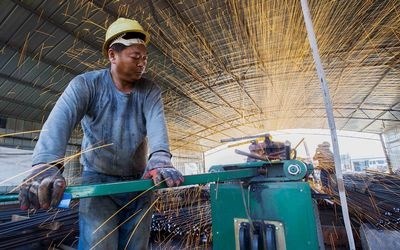
Top stories






More news












Logistics & Transport
Maersk reroutes sailings around Africa amid Red Sea constraints




"This (gazetting) relates to the import duties — from 0% to the bound rate of 10% — (to be levied) on imported primary steel that is not locally produced. The last two applications, being hot-rolled coil and other bars and rods, were gazetted (in June)," the company said.
SA’s largest steel maker said that since the general levying of 10% import duties in December, its main Vanderbijlpark flat steel products plant and the Newcastle long steel plant in KwaZulu-Natal were running at improved capacity levels.
It also said it had made good progress with "key initiatives aimed at protecting the company’s future".
ArcelorMittal SA posted a loss of R8.63bn in the year ended December 2015, from a loss of R158m a year earlier, amid a surge of cheaper Chinese steel imports into SA.
The key initiatives included a long-delayed broad-based black economic empowerment transaction. The company said the terms of this deal were expected to be announced in the fourth quarter. ArcelorMittal SA has been in conflict with the government over its lack of empowerment credentials and the monopoly prices it has charged for its steel. The state is pumping billions of rand into infrastructure development, but has pointedly avoided designating certain types of locally produced steel for various economic sectors.
ArcelorMittal SA said: "The pricing mechanism for local flat steel, which is being discussed with the Department of Trade and Industry and the Economic Development Department, has not been finalised."
The company also said it had submitted five safeguard duty applications to the International Trade Administration Commission of SA for approval. Success was likely to result in much higher tariffs placed on products such as hot-rolled coil.
The government has advised the company that a provision designating all steel as local — including imported steel — had been revoked. This had enabled imported steel to be used in the building of Eskom’s Medupi and Kusile power stations at the expense of domestic steel.

For more than two decades, I-Net Bridge has been one of South Africa’s preferred electronic providers of innovative solutions, data of the highest calibre, reliable platforms and excellent supporting systems. Our products include workstations, web applications and data feeds packaged with in-depth news and powerful analytical tools empowering clients to make meaningful decisions.
We pride ourselves on our wide variety of in-house skills, encompassing multiple platforms and applications. These skills enable us to not only function as a first class facility, but also design, implement and support all our client needs at a level that confirms I-Net Bridge a leader in its field.
Go to: http://www.inet.co.za